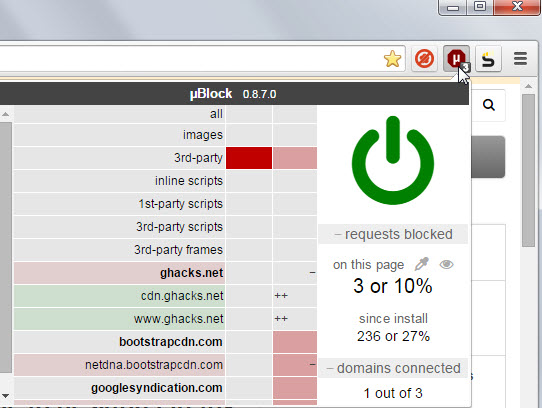uBlock’s all and third-party deny modes block requests by default
Most content blockers use lists to determine what should be blocked and what should be loaded when a user makes a request.
Options to add custom filters are provided by many blocker extensions. If you are using the popular uBlock extension for example, you know that you can load and unload various network lists but also add your own custom rules that the extension follows to the letter.
The most recent development version of uBlock improves the extension's default deny blocking options by adding two new request types, all and third-party, to its list of options.
These options enable you to block (or allow) all requests of the selected type but with options to override the selection on a per-site basis.
The following default blocking options are provided, the two new types are highlighted.
- All - This works similar to how NoScript operates: don't allow anything to be loaded by default without user permission.
- Images - Allow or deny the loading of images.
- 3rd-party - This blocks third-party requests by default.
- inline, 1st-party or 3rd-party scripts - These three options block scripts that are loaded inline, from the same resource you are connected to or from third-party sites.
- 3rd-party frames - Blocks frames from third-party sites.
Setting it up

The option to block 3rd-party requests and all requests has been added in the most recent development version.
You only get to those options after checking the advanced user setting in the options. Once you have checked the option, click on the uBlock icon and then on requests blocked to display the filtering options.
There you find general blocking options at the top and below that the list of domains requests. The status of each requests is highlighted as well and you can override it easily here if the need arises.
To disable third-party requests click on the red part next to 3rd-party by moving the mouse there. Once done, all third-party requests are blocked by default.
You can override the selection on a per-domain basis and may need to do so on sites that use these requests for part of their core functionality.
Some sites may use other domains to load contents from. Google for instance uses loads data from gstatic.com and googleusercontent.com when you connect to its properties. While some work fine without allowing those, others may block contents from working correctly.
The benefits of blocking third-party requests range from faster page loading times to improved privacy and better resource usage.
The only negative issue that may arise is that some websites may not work properly anymore once you enable it. This happens if they require contents from third-party sites to function. You can fix that easily though by enabling those requests individually.
While that means additional work, it ensures that requests are only made if they are required for the site's functionality.
This article was first seen on ComTek's "TekBits" Technology News

- Log in to post comments